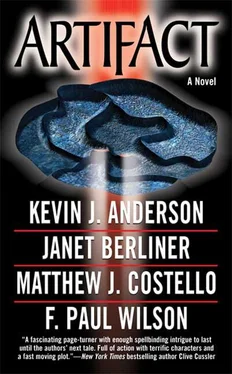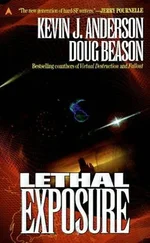Kevin Anderson - Artifact
Здесь есть возможность читать онлайн «Kevin Anderson - Artifact» весь текст электронной книги совершенно бесплатно (целиком полную версию без сокращений). В некоторых случаях можно слушать аудио, скачать через торрент в формате fb2 и присутствует краткое содержание. Жанр: Фантастика и фэнтези, на английском языке. Описание произведения, (предисловие) а так же отзывы посетителей доступны на портале библиотеки ЛибКат.
- Название:Artifact
- Автор:
- Жанр:
- Год:неизвестен
- ISBN:нет данных
- Рейтинг книги:4 / 5. Голосов: 1
-
Избранное:Добавить в избранное
- Отзывы:
-
Ваша оценка:
- 80
- 1
- 2
- 3
- 4
- 5
Artifact: краткое содержание, описание и аннотация
Предлагаем к чтению аннотацию, описание, краткое содержание или предисловие (зависит от того, что написал сам автор книги «Artifact»). Если вы не нашли необходимую информацию о книге — напишите в комментариях, мы постараемся отыскать её.
Artifact — читать онлайн бесплатно полную книгу (весь текст) целиком
Ниже представлен текст книги, разбитый по страницам. Система сохранения места последней прочитанной страницы, позволяет с удобством читать онлайн бесплатно книгу «Artifact», без необходимости каждый раз заново искать на чём Вы остановились. Поставьте закладку, и сможете в любой момент перейти на страницу, на которой закончили чтение.
Интервал:
Закладка:
Keene had once invested a small amount of money in offshore drilling. The investment had led to a significant amount of reading for which, he thought, he was presently grateful. Without that, he would not have had the vaguest understanding of what was going on. Because of it, he knew that theValhalla rig pumped crude oil from strata deep beneath the sea, but did not bring it up into the big platform itself; instead, the fresh crude was shunted to a pipeline laid across the ocean floor toward a separate derrick, a stand-alone pumping station to which the oil tanker was secured.
On a crane high above the secondary platform, heavy nozzles dangled downward. With the cargo holds of theYucatán open beneath them like the gaping mouths of hungry birds, the crude oil from theValhalla rig gushed out of the nozzles, filling the numerous interconnected but compartmentalized chambers that made up the bulk of the tanker.
TheYucatán had a double hull, an outer shell to avoid punctures of the inner compartments—extremely conservative efforts designed to prevent disastrous oil spills. The crude petroleum poured out from the pumping platform at an enormous flow rate, but even so it would take many hours to fill the supertanker. The respite gave plenty of time for most of theYucatán ’s crew members to shuttle over to the relative metropolis of theValhalla rig.
Keene was struck by how much the tanker’s deck looked like the Great Plains, only uglier. The expanse was dirty and stained, a long series of riveted metal plates studded with hatches and vent chimneys. Lines of different colors—red, blue, and yellow—were painted in patterns across the deck, zone demarcations of some sort. The hieroglyphics were too large for anyone to make out at this level. He figured that they were something like the lines and roads Incas had made in the South American plains, depicting giant shapes visible only from high-flying aircraft.
The crane holding the hoses from the pumping substation extended down into the prow’s main hatch, pouring into the primary tank holds. Behind them, the tall nine-deck structure of the bridge housing and habitation levels looked the size of an office complex. Lights blazed from the windows, gleaming up on theYucatán ’s radar mast and the long cable of the radio antenna.
Keene fixed his gaze on the huge structure of theValhalla platform a quarter mile away. Holding the tanker’s deck rail, he stared at the rig—a dazzling cluster of lights riding high above the gentle Caribbean waves. A torch of natural gas blasted from the end of the flare tip which extended on a long derrick far from the rest of the structure. A tall derrick stood like the Eiffel Tower in the center of the airport-sized deck.
When he saw a challenge like that, he had to go for it. The central derrick was the highest thing around. He wanted to touch it, the way a kid reaches for the star on the top of the Christmas tree. McKendry would say he was thinking crazy—which was true. On the other hand, that was what he was good at.
Keene stripped to his shorts. He climbed down the metal ladder on the outer hull of theYucatán and plunged into the tropical waters. The water was calm and warm, and the tanker and the production rig were huge landmarks even under the pallid moonlight. A powerful swimmer, he estimated that he could relax and cross the distance in less than twenty minutes.
Just enough to work up a little sweat, he thought, interrupting his steady, gentle strokes to tread water so that he could look up at the star-studded night sky. Neither the weather nor the distance concerned him. Unlike McKendry, he didn’t have a problem with whatever critters inhabited the depths of these Caribbean waters.
He recalled one time on Lake Tahoe. A couple of dancers had taken the two of them on one of those boat tours around the lake. About halfway around, one of the women took it into her head to move to the rail and yell, “Shark!”
To give him his due, McKendry hadn’t been the only one to go on automatic and suspend disbelief. However, while the others moved to the rail on a shark watch, McKendry paled and moved farther away from it.
Time to get over it, buddy, Keene thought, laughing out loud. As far as he was concerned, if he couldn’t outswim a shark for a mere quarter of a mile, then he wasn’t much of a swimmer.
Stroke after stroke after stroke.
Doing nicely, Keene thought, a little surprised despite himself. He was feeling the effort in his muscles, but that was to be expected. It had been some time since he or McKendry had done any serious exercise. His partner would feel the strain every bit as much.
Closing in on theValhalla platform, thinking about his partner, Keene became aware of the sleek death of sharks swimming below. The idea, he admitted to himself, was not exactly pleasant. He wanted to believe that the noise and chemical leakage and higher temperatures from the offshore structure would drive away such predators, but he knew differently. Part of his education as a short-term investor had taught him that the environment around oil platforms was a boon for fish, and with the increased schools living among the concrete support pillars, he supposed that sharks might also hang out in the better feeding grounds.
He increased his speed, and was happy to reach the shadow of the platform and pull himself up to the metal rungs alongside the fat elephant leg of the pier. Better not rest here, he told himself. You look like somebody’s midnight snack. He grasped the rungs and scrambled up, not stopping until he was ten feet out of the water.
Access ladders led up the concrete support legs to the main platform. He looked at the long line of rungs waiting for him. It was quite a way to climb, especially if he wanted to make it to the top of the central derrick in good time.
He climbed higher, to the underpart of the main platform. It hung like a broad airplane hangar above him. Lifeboats dangled under the deck; in an emergency, they could drop a hundred feet down to the sea. Keene recalled having read somewhere that more people were killed during oil rig safety drills testing out the hazardous systems than had ever been hurt in other kinds of accidents on oil rigs.
He listened to the waves echoing in the superstructure, looked at the immense core of theValhalla, and found himself awed that something this huge could be built in a harbor and towed out to sea to be anchored elsewhere.
“Moving on up,” he said into the wind.
He began to climb again. Once he reached the undercarriage of the main platform, he followed catwalks, ascended metal steps, ducked through hatches until he stood on the main deck.
A helipad covered a large, flat circle atop the main platform. Next to that was an oil-processing area filled with huge tanks and a nightmare maze of piping. Radio masts and cranes protruded like spines from the rig.
At any moment, Keene expected to be stopped by a security patrol, but the platform supervisors were ridiculously complacent in their security. The pumps and generators hummed and clanked, making loud sounds in the night, but he met no one. Most of the blazing lights he had seen from a distance seemed to be for decorative purposes only, except for the natural blowtorch off to the side; the flare tip hissed and blasted its perpetual flame, removing excess natural gas from the operations.
Keene sprinted across the platform deck toward the central derrick, which stood like a skyscraper in the middle of theValhalla . He could have taken an elevator, of course, but that would have been too easy. And too noisy. Even sleeping security guards could be awakened if the noise was loud enough. Instead, he took the winding ribbon of metal stairs around and around the iron latticework of the structure, heading toward the narrow tip that supported the rig’s central production shaft and pipe.
Читать дальшеИнтервал:
Закладка:
Похожие книги на «Artifact»
Представляем Вашему вниманию похожие книги на «Artifact» списком для выбора. Мы отобрали схожую по названию и смыслу литературу в надежде предоставить читателям больше вариантов отыскать новые, интересные, ещё непрочитанные произведения.
Обсуждение, отзывы о книге «Artifact» и просто собственные мнения читателей. Оставьте ваши комментарии, напишите, что Вы думаете о произведении, его смысле или главных героях. Укажите что конкретно понравилось, а что нет, и почему Вы так считаете.












